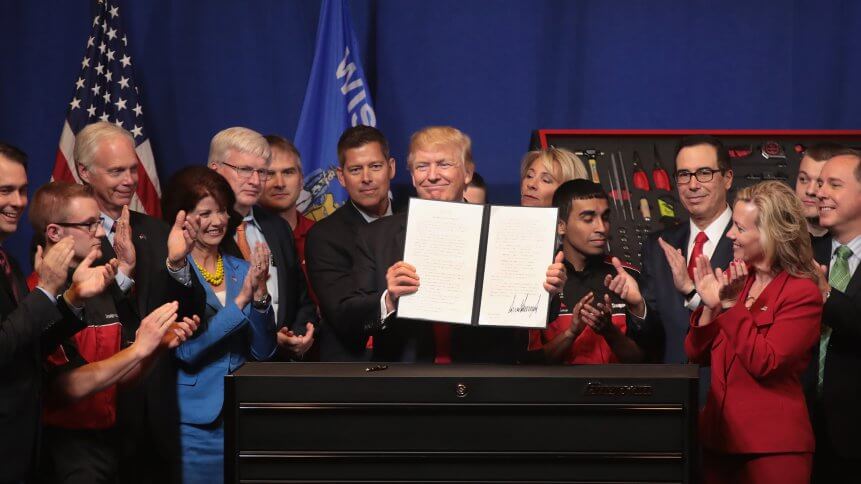Why Google, Amazon & Apple are against US H-1B visa restrictions

- The H-1B visa program will be temporarily suspended until December 2020
- The majority of H-1B holders come from India and China
- US companies are concerned the freeze will threaten a consistent supply of foreign talent
Some of America’s biggest tech giants are opposing President Trump’s suspension of the H-1B visa that allows a limited number of degree-holding, skilled foreigners the right to work in the states, citing potential disruption to a consistent supply of tech talent.
The move comes after years of gradual limiting on the amount of worker visas issued, and that some arguing that their availability impacts employment prospects for US citizens. Due to the recent coronavirus pandemic, US unemployment rates have experienced a sudden rise, accelerating the dramatic push.
Business leaders are speaking out against the new restrictions, saying that the move will inhibit America’s access to a global talent pool, which is critical for the nation to remain competitive and innovative.
Immigration has contributed immensely to America’s economic success, making it a global leader in tech, and also Google the company it is today. Disappointed by today’s proclamation – we’ll continue to stand with immigrants and work to expand opportunity for all.
— Sundar Pichai (@sundarpichai) June 22, 2020
CEO of the U.S. Chamber of Commerce, Thomas Donohue issued a statement: “Putting up a ‘not welcome’ sign for engineers, executives, IT experts, doctors, nurses, and other workers won’t help our country, it will hold us back.
“For us to remain globally competitive, we need the best and brightest. That’s been our secret sauce,” added Gary Shapiro, the president of the Consumer Technology Association, an industry trade group.
Three years ago, President Trump ordered a comprehensive review of the H-1B visa program.
Now is not the time to cut our nation off from the world’s talent or create uncertainty and anxiety. Immigrants play a vital role at our company and support our country’s critical infrastructure. They are contributing to this country at a time when we need them most.
— Brad Smith (@BradSmi) June 23, 2020
The government’s official announcement stated, “In order to promote the proper functioning of the H-1B visa program, the Secretary of State, the Attorney General, the Secretary of Labor, and the Secretary of Homeland Security shall, as soon as practicable, suggest reforms to help ensure that H-1B visas are awarded to the most-skilled or highest-paid petition beneficiaries.”
The H-1B visa program is one of the primary ways that companies in the US are able to hire highly-skilled foreign workers, filling demanding and challenging roles, especially in the tech industry. A halt on the program has made the US less appealing for foreign talents and is driving the massive foreign talent pool to pursue their (no longer American) dreams elsewhere.
In 2018, TechHQ spoke with Karen-Lee Pollak, a Dallas, Texas-based Immigration Lawyer and Managing Partner of Pollak Immigration, regarding the impact of having a more restrictive H-1B visa program.
Like Apple, this nation of immigrants has always found strength in our diversity, and hope in the enduring promise of the American Dream. There is no new prosperity without both. Deeply disappointed by this proclamation.
— Tim Cook (@tim_cook) June 23, 2020
Pollak shared that the tightening policies are, in reality, making the US less competitive; “it just does not make sense,” she said.
“We are in desperate need of people in the science, technology, engineering, and math fields (STEM) in order to remain competitive with the rest of the world,” Pollak continued.
“From the perspective of the employer, companies cannot grow their businesses or plan for the future relying on the H-1B lottery system, so they are taking these jobs off-shore, resulting in a loss of revenue and jobs in the United States.”
YOU MIGHT LIKE

Canada joins in the race for tech talent
While the US is temporarily shutting its borders to some, neighbouring Canada is taking various approaches to attract top tech talent to its shores. In 2017, the nation launched a program called the Global Team Stream, aiming to expedite the visa application of skilled tech workers — slicing a 10 month processing time to a mere two weeks. The Canadian government announced that since the program’s launch in January 2019, the country has hired more than 4,000 foreign talents through the program.
Trump’s revision of the H-1B visa program in 2017 has even led to some US-based tech companies crossing the border and setting up new bases in Canada. Tech giants such as Google, Facebook, Twitter, and Amazon marked their territories in emerging tech hubs, Toronto and Waterloo. Meanwhile, other tech companies established their roots in Vancouver and Montreal.
The recent announcement is likely to stir a similar effect as tech companies are expressing concerns on the impact of the pandemic that saw a halt to many tech projects and innovations. The announcement will lead to further uncertainty and disruptions to the industry.
Leaders of the tech world are calling out the reverse progression of the move.









